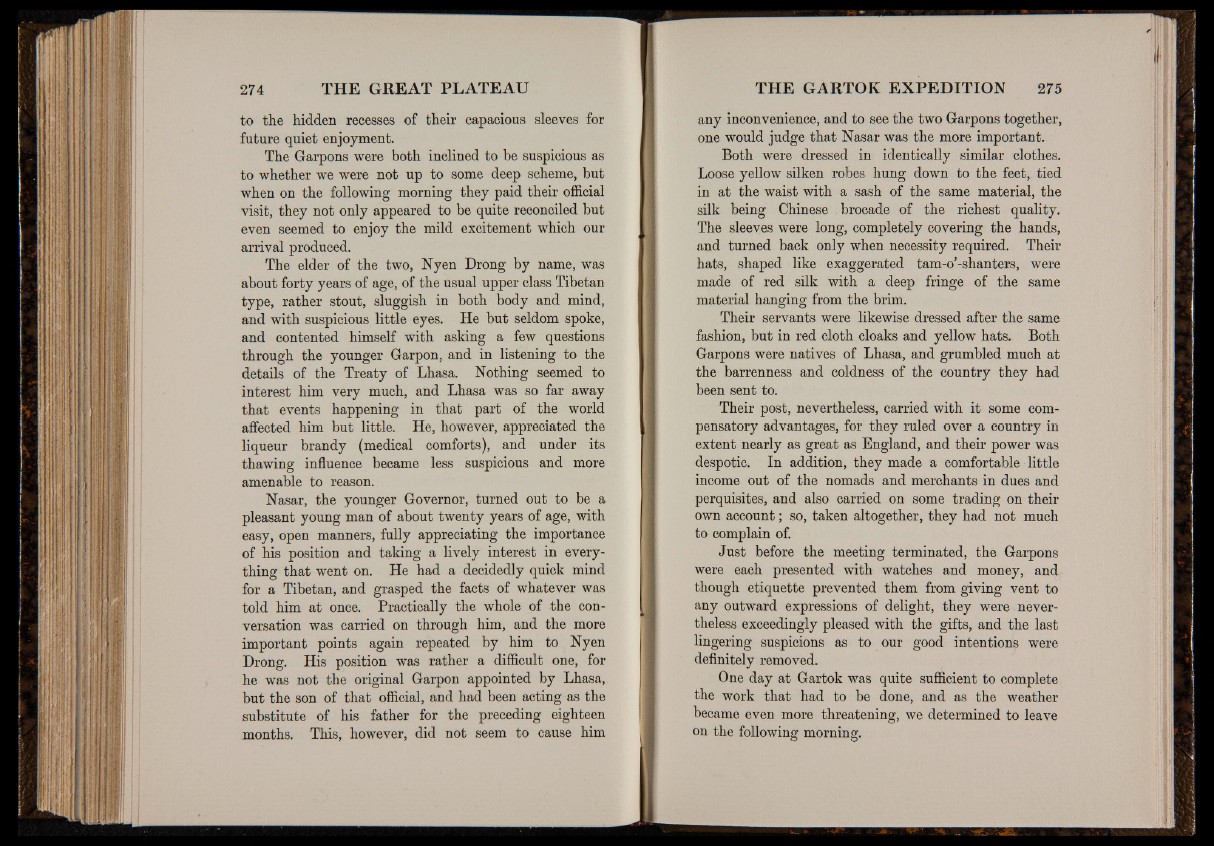
to the hidden recesses of their capacious sleeves for
future quiet enjoyment.
The Garpons were both inclined to be suspicious as
to whether we were not up to some deep scheme, but
when on the following morning they paid their official
visit, they not only appeared to be quite reconciled but
even seemed to enjoy the mild excitement which our
arrival produced.
The elder of the two, Nyen Drong by name, was
about forty years of age, of the usual upper class Tibetan
type, rather stout, sluggish in both body and mind,
and with suspicious little eyes. He but seldom spoke,
and contented himself with asking a few questions
through the younger Garpon, and in listening to the
details of the Treaty of Lhasa. Nothing seemed to
interest him very much, and Lhasa was so far away
that events happening in that part of the world
affected him but little. He, however, appreciated the
liqueur brandy (medical comforts), and under its
thawing influence became less suspicious and more
amenable to reason.
Nasar, the younger Governor, turned out to be a
pleasant young man of about twenty years of age, with
easy, open manners, fully appreciating the importance
of his position and taking a lively interest in everything
that went on. He had a decidedly quick mind
for a Tibetan, and grasped the facts of whatever was
told him at once. Practically the whole of the conversation
was carried on through him, and the more
important points again repeated by him to Nyen
Drong. His position was rather a difficult one, for
he was not the original Garpon appointed by Lhasa,
but the son of that official, and had been acting as the
substitute of his father for the preceding eighteen
months. This, however, did not seem to cause him
any inconvenience, and to see the two Garpons together,
one would judge that Nasar was the more important.
Both were dressed in identically similar clothes.
Loose yellow silken robes hung down to the feet, tied
in at the waist with a sash of the same material, the
silk being Chinese brocade of the richest quality.
The sleeves were long, completely covering the hands,
and turned back only when necessity required. Their
hats, shaped like exaggerated tam-o’-shanters, were
made of red silk with a deep fringe of the same
material hanging from the brim.
Their servants were likewise dressed after the same
fashion, but in red cloth cloaks and yellow hats. Both
Garpons were natives of Lhasa, and grumbled much at
the barrenness and coldness of the country they had
been sent to.
Their post, nevertheless, carried with it some compensatory
advantages, for they ruled over a country in
extent nearly as great as England, and their power was
despotic. In addition, they made a comfortable little
income out of the nomads and merchants in dues and
perquisites, and also carried on some trading on their
own account; so, taken altogether, they had not much
to complain of.
Just before the meeting terminated, the Garpons
were each presented with watches and money, and
though etiquette prevented them from giving vent to
any outward expressions of delight, they were nevertheless
exceedingly pleased with the gifts, and the last
lingering suspicions as to our good intentions were
definitely removed.
One day at Gartok was quite sufficient to complete
the work that had to be done, and as the weather
became even more threatening, we determined to leave
on the followingO; morningO.